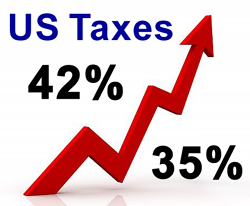 It may come as a surprise that US companies pay the highest taxes in the world. Yes, you read that right! American businesses, large and small and across all industries pay from 35% to 41.6% of their income in combined state and federal taxes. The 41.6% maximum rate is scheduled to rise to 46.2% in 2010 when President Obama’s promised tax increases are implemented. Compare that to socialist France where companies pay only 34.4% in taxes, to China where the rate is 25%, or Russia which levies a mere 24%. Corporations in Ireland, Europe’s fastest growing economy for the last 18 years, pay just 12.5% in taxes.
It may come as a surprise that US companies pay the highest taxes in the world. Yes, you read that right! American businesses, large and small and across all industries pay from 35% to 41.6% of their income in combined state and federal taxes. The 41.6% maximum rate is scheduled to rise to 46.2% in 2010 when President Obama’s promised tax increases are implemented. Compare that to socialist France where companies pay only 34.4% in taxes, to China where the rate is 25%, or Russia which levies a mere 24%. Corporations in Ireland, Europe’s fastest growing economy for the last 18 years, pay just 12.5% in taxes.
Because of its dual taxation system, US businesses and individuals are required to pay both state and federal taxes on their income. When combined both these taxes range from a minimum of 35% in states like Nevada, South Dakota, and Wyoming that do not tax business income, to a maximum of 41.6% in Iowa, the state with the highest corporate tax rate of 12%.
Corporate Tax Rates, US vs. Other Free-Market Democracies
Last year the Tax Foundation, a nonpartisan educational organization with a solid reputation for independence and credibility, released a report that compared the tax rates of US corporations (across all 50 states) with 29 other countries that accept the principles of representative democracy and free-market economy (referred to as OCED countries, 30 total). Their study reveals the surprising finding that US companies are already at a significant competitive disadvantage in the world economy.
When compared to other OECD countries:
• 24 US states have a corporate tax rate higher than top-ranked Japan.
• 32 states have a corporate tax rate higher than third-ranked Germany.
• 46 states have a corporate tax rate higher than fourth-ranked Canada.
• All 50 states have a corporate tax rate higher than fifth-ranked France.
(The Tax Foundation, 2008)
The full chart comparing the various US tax rates versus all the other OCED countries is available here: https://chrisbanescu.com/blog/2008/12/27/us-corporate-tax-rates-vs-all-oecd-countries/
Based on gross domestic product (GDP) data from 2008, Japan was ranked as the world’s second largest economy, Germany was the fourth largest, France was the fifth largest, and Canada was the eleventh largest economy. (CIA World Factbook on Wikipedia)
All 50 States Higher Taxes Than 27 OCED Countries
Among other surprises, all 50 US states have a combined corporate tax rate higher than even Italy, Spain, United Kingdom, Greece, Sweden, Norway, Finland, Austria, Switzerland, Denmark, Hungary, New Zealand, Australia, Mexico, Turkey, and South Korea. All 50 US states have higher tax rates than 27 of the other OCED countries.
When compared with companies based in Ireland with a 12.5% flat tax rate, US corporations that face an average 39.3% rate are taxed at 3.1 times Ireland’s rate. When contrasted with Iceland (18%), Turkey (20%), Poland (20%), and Switzerland (21.3%) US companies pay roughly twice the tax rates of their foreign counterparts.
Even our cousins across the pond levy lower rates. The United Kingdom requires 30% in taxes while the US companies pay on average 39.3%; that’s a 31% premium.
US Corporate Tax Rates Highest Among The World’s Largest 15 Economies
The comparison doesn’t stop with the OCED countries. US corporations compete in a global marketplace where many other non-OCED countries also operate. When looking outside the 30 free-market democracies that the Tax Foundation examined, things are just as ominous for American firms.
Based on the GDP data from 2008, some of the world’s largest economies are also providing a tax environment much friendlier to businesses than the United States.
Communist China, the world’s third largest economy, lowered its top corporate tax rate to 25% as of January 1, 2008. The new tax rate replaced the previous one of 33%.
Russia, the world’s eighth largest economy, currently taxes its corporations just 24%.
Brazil, the world’s tenth largest economy, taxes its companies a maximum 34% rate.
India, the world’s twelfth largest economy, taxes its corporations at a rate of 33%.
The United States is the world’s largest economy. When compared to the next 14 countries that represent the world’s largest economies by GDP as of 2008, from the second largest (Japan) to the fifteenth largest (South Korea), the emerging patterns are striking:
- 24 US states have higher corporate tax rates than all 14 other countries.
- 32 US states have higher corporate tax rates than 13 of the 14 countries.
- 46 US states have higher corporate tax rates than 12 of the 14 countries.
- All 50 states have higher corporate tax rates than 11 of the 14 countries.
The full chart comparing all the US tax rates versus the world’s largest economies is available here: https://chrisbanescu.com/blog/2008/12/29/us-corporate-tax-rates-vs-worlds-largest-economies/
Raising Taxes Further on US Businesses
In the face of aggressive global competition and in spite of the considerable tax burdens they operate under, US businesses have somehow managed to prosper and grow and maintain America’s prominence as the world’s largest economy. Unfortunately, as the global competitive marketplace has expanded and countries like China, India, and Russia ramp up their economic might and move away from punitive corporate taxation, many of America’s politicians are taking America in exactly the opposite direction.
In the midst of a serious global economic slowdown, with devastating reductions in corporate profits, accelerating business bankruptcies, and massive corporate layoffs, many state lawmakers are working to increase tax rates and fees on corporations and businesses. Concurrently, the White House and a majority of representatives in Congress are promising more tax increases and the elimination of many tax credits. Instead of helping US companies be more competitive and profitable and thereby allow the US economy to remain the job creating engine and economic driver of the world, our politicians are punishing and handicapping them. What could they be thinking?
2010 Corporate Tax Rate: US = 46.2%, China = 25%
Looking towards 2010, if President Obama and Congressional Democrats keep their promises, we will witness the once unthinkable: free-market America will tax its companies at 46.2%, almost double the rate of state-controlled China at 25%. As the world’s largest economies continue to embrace lower corporate tax rates, a friendlier business environment, and greater prosperity for their people, the US will move backwards to the failed policies of the past, of punitive taxation and mediocre growth at best.



Chris,
Brilliant as usual. This is a good analysis which makes your article a documentary not a political one. Keep writing may be one day you’ll be able to wake us up.
High US taxes due to federal and state taxation are a consequence of the combination of US citizens not knowing their Constitution and its history and a corrupt federal government. More specifically…
Noting that the Founders made the federal Constitution to limit (cripple) the powers of the federal government, the 10th Amendment reserving the lion’s share of government power to serve the people to the states, Chief Justice Marshall had established the following case precedent which appropriately limits the power of the feds to lay taxes.
So consider that the stimulus package can be thought of as the federal government returning money to the states that it stole from the states in the first place.
The bottom line is that the 16th Amendment needs to be repealed. This is the amendment that gives the feds the power to tax the people directly. The problem with that amendment is that it makes it too easy for the corrupt federal government to lay constitutionally unauthorized taxes, in my opinion.